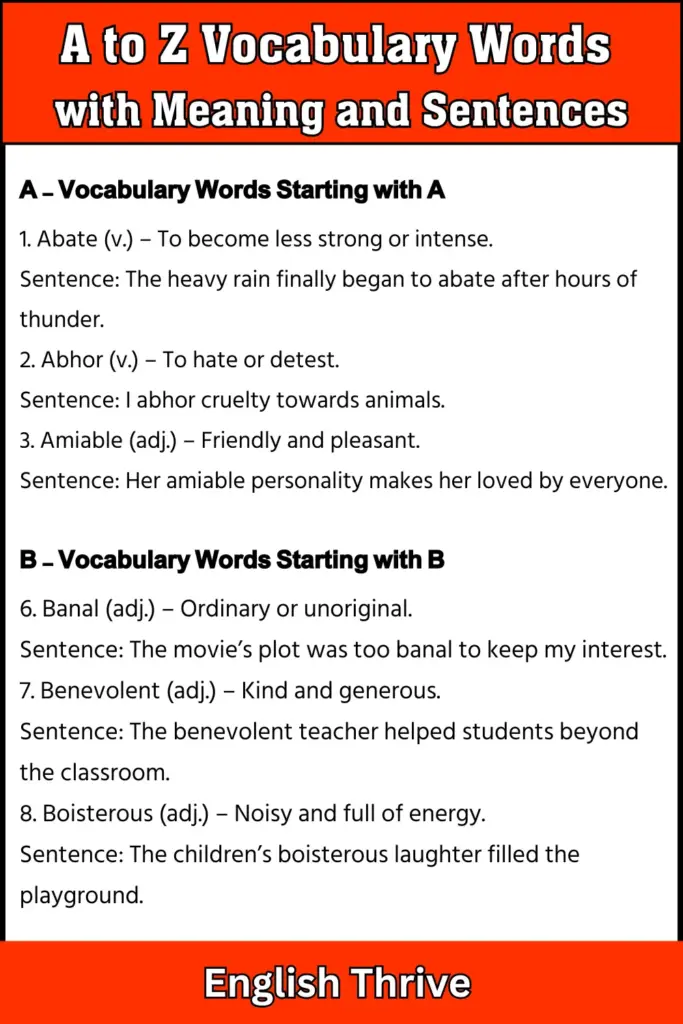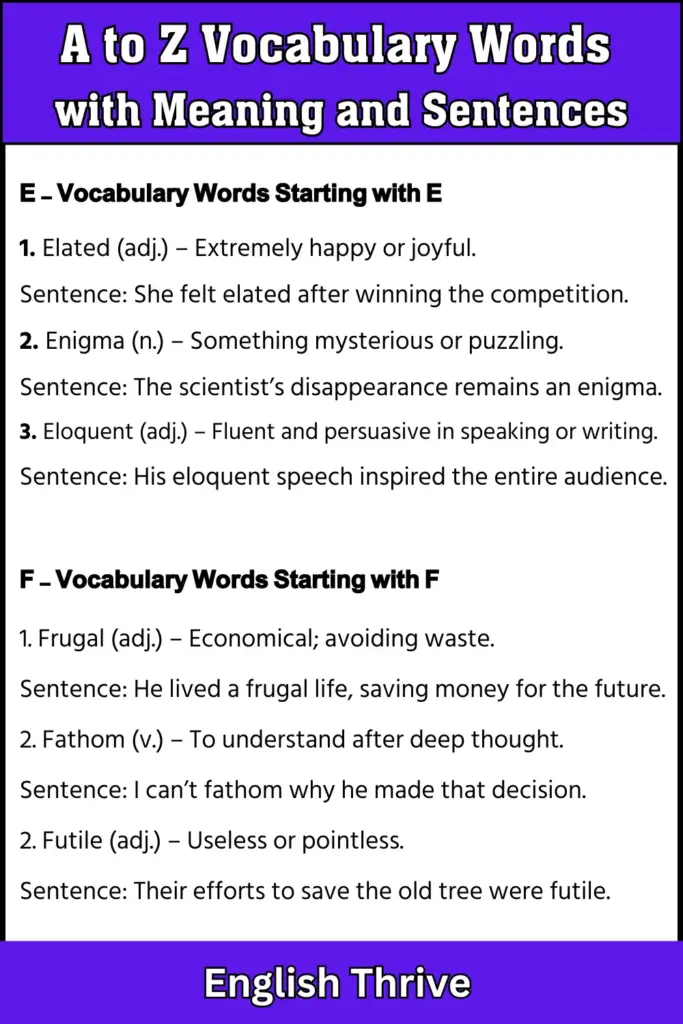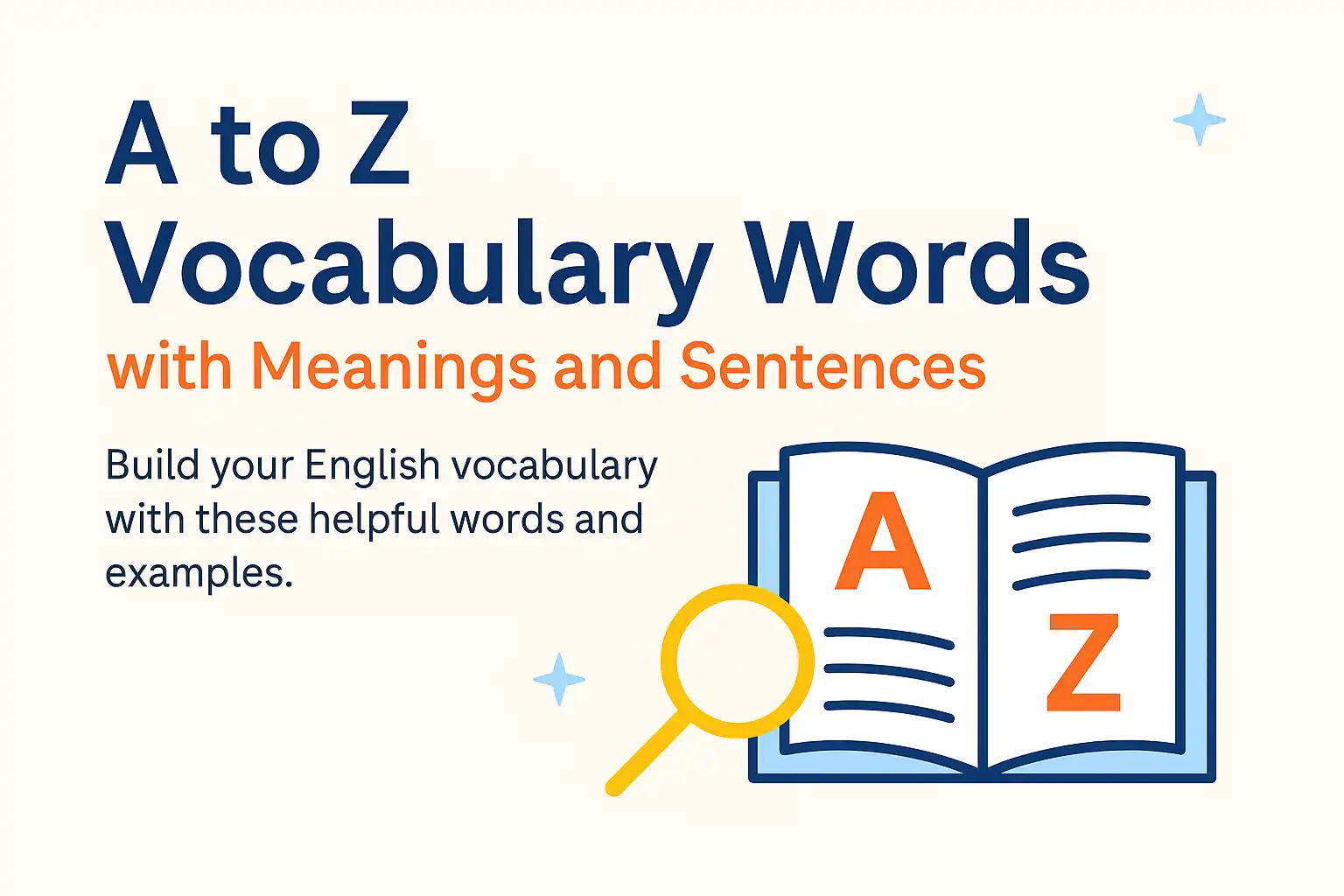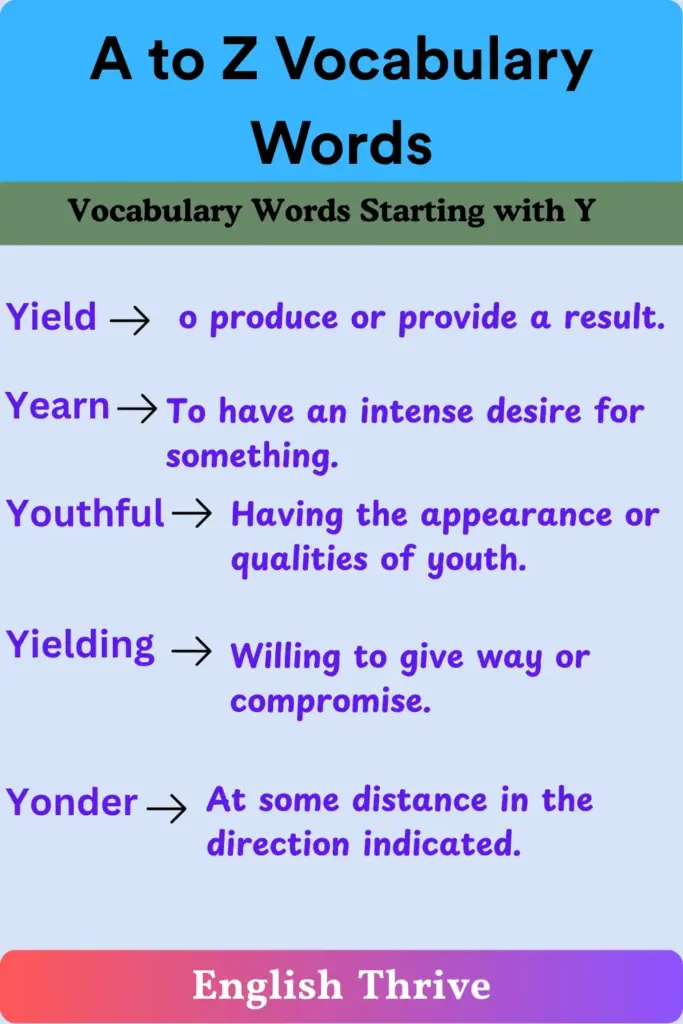Want to improve your English skills quickly? Learning A to Z vocabulary words with meanings and sentences helps you express ideas clearly and confidently.
This guide contains lists of powerful English words with simple meanings and real-life examples, so you can use them naturally in speaking, writing, and exams. Build your vocabulary step by step — and become fluent in no time!
Contents
ToggleWhy Vocabulary Is the Foundation of Effective Communication
Learning new words is one of the most important steps in mastering English. Think of vocabulary as the building blocks of language — without words, even grammar can’t stand!
Here’s why growing your vocabulary is so important:
1. It makes communication clearer and more powerful.
When you know the right words, you can explain ideas precisely instead of using vague phrases. Saying “I was elated” instead of “I was happy” adds emotion and depth to your message.
2. It improves reading and writing skills.
The more words you know, the easier it becomes to understand complex texts — and to write your own with style and confidence.
3. It boosts confidence in speaking.
Have you ever paused mid-sentence because you couldn’t find the right word? Expanding your vocabulary eliminates that hesitation, helping you speak smoothly and naturally.
4. It enhances creativity.
Words are like colors for writers and speakers — the more you have, the more beautifully you can paint your ideas.
5. It helps in academic and professional success.
Strong vocabulary skills can give you a real edge — from acing exams like IELTS, TOEFL, or SAT to impressing in interviews and presentations.
So, if you’ve ever wondered why English learners emphasize vocabulary so much, that’s the reason! Each new word you learn opens another door to understanding and self-expression.
A to Z Vocabulary Words with Meaning and Sentences
Here’s a handpicked list of A to Z vocabulary words with meaning and sentences to help you enrich your English and use them naturally in daily conversation or writing.
A — Vocabulary Words Starting with A
1. Abate (v.) – To become less strong or intense.
Sentence: The heavy rain finally began to abate after hours of thunder.
2. Abhor (v.) – To hate or detest.
Sentence: I abhor cruelty towards animals.
3. Amiable (adj.) – Friendly and pleasant.
Sentence: Her amiable personality makes her loved by everyone.
4. Astute (adj.) – Clever and perceptive.
Sentence: The astute student quickly solved the tricky math problem.
5. Audacious (adj.) – Bold and daring.
Sentence: It was an audacious plan, but it worked perfectly.
B — Vocabulary Words Starting with B
6. Banal (adj.) – Ordinary or unoriginal.
Sentence: The movie’s plot was too banal to keep my interest.
7. Benevolent (adj.) – Kind and generous.
Sentence: The benevolent teacher helped students beyond the classroom.
8. Boisterous (adj.) – Noisy and full of energy.
Sentence: The children’s boisterous laughter filled the playground.
9. Brevity (n.) – Shortness or conciseness.
Sentence: The speaker’s brevity kept the audience engaged.
10. Burgeon (v.) – To grow or develop quickly.
Sentence: Small online businesses continue to burgeon in the digital age.

C — Vocabulary Words Starting with C
11. Candor (n.) – Honesty or openness.
Sentence: We appreciated her candor when discussing the issue.
12. Candid (adj.) – Truthful and straightforward.
Sentence: His candid remarks surprised everyone.
13. Coherent (adj.) – Logical and well-organized.
Sentence: The essay was coherent and easy to follow.
14. Concur (v.) – To agree or have the same opinion.
Sentence: Experts concur that exercise improves mental health.
15. Credible (adj.) – Believable or trustworthy.
Sentence: The news report was based on credible sources.
D — Vocabulary Words Starting with D
16. Diligence (n.) – Careful and consistent effort.
Sentence: Her diligence helped her achieve top grades.
17. Dauntless (adj.) – Fearless and determined.
Sentence: The firefighters were dauntless in saving lives.
18. Deft (adj.) – Skillful and quick.
Sentence: The artist’s deft strokes brought the painting to life.
19. Dubious (adj.) – Doubtful or uncertain.
Sentence: His explanation sounded dubious to everyone.
20. Deter (v.) – To discourage from doing something.
Sentence: The strict rules deter students from cheating.
E — Vocabulary Words Starting with E
21. Elated (adj.) – Extremely happy or joyful.
Sentence: She felt elated after winning the competition.
22. Enigma (n.) – Something mysterious or puzzling.
Sentence: The scientist’s disappearance remains an enigma.
23. Eloquent (adj.) – Fluent and persuasive in speaking or writing.
Sentence: His eloquent speech inspired the entire audience.
24. Empathy (n.) – The ability to understand others’ feelings.
Sentence: True leaders show empathy towards their team members.
25. Exuberant (adj.) – Full of energy and enthusiasm.
Sentence: The crowd gave an exuberant cheer after the concert.
F — Vocabulary Words Starting with F
26. Frugal (adj.) – Economical; avoiding waste.
Sentence: He lived a frugal life, saving money for the future.
27. Fathom (v.) – To understand after deep thought.
Sentence: I can’t fathom why he made that decision.
28. Futile (adj.) – Useless or pointless.
Sentence: Their efforts to save the old tree were futile.
29. Fervent (adj.) – Having strong emotion or belief.
Sentence: She is a fervent supporter of environmental causes.
30. Fluctuate (v.) – To change or vary irregularly.
Sentence: Stock prices often fluctuate throughout the day.

G — Vocabulary Words Starting with G
31. Gregarious (adj.) – Sociable and outgoing.
Sentence: Her gregarious personality makes her the life of every party.
32. Gratify (v.) – To please or satisfy.
Sentence: It gratified her to see the students succeed.
33. Gallant (adj.) – Brave or heroic.
Sentence: The gallant soldier saved his comrades.
34. Gloomy (adj.) – Dark or depressing.
Sentence: The gloomy weather made everyone feel tired.
35. Gracious (adj.) – Kind, polite, and generous.
Sentence: The host was gracious and welcoming to all guests.
H — Vocabulary Words Starting with H
36. Harbinger (n.) – A sign of something to come.
Sentence: The dark clouds were a harbinger of rain.
37. Humble (adj.) – Modest and not arrogant.
Sentence: Despite his fame, he remained humble and kind.
38. Hinder (v.) – To slow down or block progress.
Sentence: The heavy snow hindered the rescue operation.
39. Hypocrisy (n.) – Pretending to have moral standards that one doesn’t follow.
Sentence: The politician was criticized for his hypocrisy.
40. Harmony (n.) – Agreement or peaceful coexistence.
Sentence: The family lived in perfect harmony.
I — Vocabulary Words Starting with I
41. Inevitable (adj.) – Certain to happen.
Sentence: Failure is inevitable if you don’t prepare.
42. Impeccable (adj.) – Perfect and flawless.
Sentence: Her manners are impeccable.
43. Illuminate (v.) – To light up or make clear.
Sentence: The moon illuminated the dark night sky.
44. Indignant (adj.) – Angry over unfair treatment.
Sentence: She was indignant at the unfair accusation.
45. Ingenious (adj.) – Clever and inventive.
Sentence: The inventor came up with an ingenious solution.
J — Vocabulary Words Starting with J
46. Juxtapose (v.) – To place side by side for comparison.
Sentence: The artist juxtaposed modern and traditional styles in her painting.
47. Jubilant (adj.) – Extremely joyful and proud.
Sentence: The jubilant fans celebrated their team’s victory.
48. Judicious (adj.) – Showing good judgment.
Sentence: A judicious choice can prevent future problems.
49. Jocular (adj.) – Humorous or playful.
Sentence: His jocular remarks lightened the mood.
50. Justify (v.) – To show that something is right or reasonable.
Sentence: She tried to justify her absence with a valid excuse.
K — Vocabulary Words Starting with K
51. Keen (adj.) – Sharp or eager.
Sentence: She has a keen interest in learning new languages.
52. Kudos (n.) – Praise for an achievement.
Sentence: He received kudos for completing the project early.
53. Kindred (adj.) – Similar in nature or character.
Sentence: They became friends because of their kindred interests.
54. Kindle (v.) – To inspire or start something.
Sentence: The teacher’s words kindled hope in the students’ hearts.
55. Knack (n.) – A special skill or talent.
Sentence: She has a knack for solving difficult puzzles.
L — Vocabulary Words Starting with L
56. Lethargic (adj.) – Lacking energy or enthusiasm.
Sentence: The hot weather made everyone feel lethargic.
57. Lucid (adj.) – Clear and easy to understand.
Sentence: The professor gave a lucid explanation of the concept.
58. Lavish (adj.) – Luxurious or extravagant.
Sentence: They threw a lavish wedding party.
59. Lofty (adj.) – High, noble, or elevated.
Sentence: He always dreamed of achieving lofty goals.
60. Linger (v.) – To stay longer than necessary.
Sentence: The sweet scent lingered in the air.
M — Vocabulary Words Starting with M
61. Meticulous (adj.) – Extremely careful with details.
Sentence: She is meticulous in checking her work.
62. Mundane (adj.) – Ordinary or dull.
Sentence: He wanted to escape his mundane routine.
63. Magnanimous (adj.) – Generous and forgiving.
Sentence: The winner was magnanimous in victory.
64. Melancholy (n.) – A feeling of sadness.
Sentence: The song had a touch of melancholy.
65. Modest (adj.) – Humble and not boastful.
Sentence: Despite her success, she remained modest.
N — Vocabulary Words Starting with N
66. Nefarious (adj.) – Wicked or criminal.
Sentence: The villain’s nefarious actions shocked everyone.
67. Nostalgia (n.) – A sentimental longing for the past.
Sentence: Old photos filled her with nostalgia.
68. Notorious (adj.) – Famous for something bad.
Sentence: The area is notorious for traffic jams.
69. Nurture (v.) – To care for and help grow.
Sentence: Parents nurture their children with love and guidance.
70. Nimble (adj.) – Quick and light in movement.
Sentence: The dancer’s nimble steps impressed the judges.
O — Vocabulary Words Starting with O
71. Obdurate (adj.) – Stubborn or unyielding.
Sentence: He remained obdurate despite everyone’s advice.
72. Omit (v.) – To leave out or exclude.
Sentence: Don’t omit any details from your report.
73. Optimistic (adj.) – Hopeful and positive.
Sentence: She stayed optimistic despite the challenges.
74. Ornate (adj.) – Decorated in a detailed or fancy way.
Sentence: The palace had ornate walls and ceilings.
75. Oblige (v.) – To do a favor or service.
Sentence: He obliged his friend by helping him move.
P — Vocabulary Words Starting with P
76. Pernicious (adj.) – Harmful in a subtle way.
Sentence: Pernicious weeds spread throughout the garden.
77. Pragmatic (adj.) – Practical and realistic.
Sentence: Her pragmatic approach solved the problem quickly.
78. Ponder (v.) – To think deeply.
Sentence: He sat quietly, pondering over his decision.
79. Profound (adj.) – Deep or meaningful.
Sentence: The book offers profound insights into human nature.
80. Provoke (v.) – To stir up or cause a reaction.
Sentence: His rude comment provoked an argument.
Q — Vocabulary Words Starting with Q
81. Quench (v.) – To satisfy thirst or extinguish.
Sentence: Cold water quenched my thirst.
82. Quixotic (adj.) – Idealistic but impractical
Sentence: His quixotic dream of world peace inspired many.
83. Quaint (adj.) – Charmingly old-fashioned.
Sentence: They stayed in a quaint little cottage by the sea.
84. Quell (v.) – To calm or suppress.
Sentence: The police managed to quell the crowd peacefully.
85. Query (n.) – A question or inquiry.
Sentence: Please email us if you have any queries.
R — Vocabulary Words Starting with R
86. Resilient (adj.) – Able to recover quickly.
Sentence: She was resilient after facing so many setbacks.
87. Revere (v.) – To respect deeply.
Sentence: Students revere teachers who inspire them.
88. Reluctant (adj.) – Unwilling or hesitant.
Sentence: He was reluctant to join the meeting.
89. Radiant (adj.) – Shining or glowing brightly.
Sentence: Her radiant smile lit up the room.
90. Rational (adj.) – Based on logic and reason.
Sentence: It’s important to stay rational in difficult situations.
S — Vocabulary Words Starting with S
91. Solace (n.) – Comfort during sorrow.
Sentence: Music gave him solace during tough times.
92. Serene (adj.) – Calm and peaceful.
Sentence: The lake looked serene under the morning sun.
93. Subtle (adj.) – Not obvious; delicate.
Sentence: She gave him a subtle hint about the surprise.
94. Sagacious (adj.) – Wise and insightful.
Sentence: The sagacious leader made the right decision.
95. Sincere (adj.) – Genuine or truthful.
Sentence: His apology sounded sincere and heartfelt.
T — Vocabulary Words Starting with T
96. Transient (adj.) – Lasting for a short time.
Sentence: Their happiness was transient but beautiful.
97. Tenacious (adj.) – Persistent and determined.
Sentence: Her tenacious attitude led her to success.
98. Tranquil (adj.) – Calm and quiet.
Sentence: The tranquil beach offered peace of mind.
99. Tactful (adj.) – Sensitive in dealing with others.
Sentence: She gave tactful feedback to avoid hurting feelings.
100. Thrive (v.) – To grow or develop successfully.
Sentence: Plants thrive in sunlight and fresh air.
U — Vocabulary Words Starting with U
- Ubiquitous (adj.) – Present, appearing, or found everywhere.
Sentence: Mobile phones have become ubiquitous in modern society. - Ultimate (adj.) – Being or happening at the end of a process; final.
Sentence: Her ultimate goal is to become a successful writer. - Unanimous (adj.) – Fully in agreement.
Sentence: The committee made a unanimous decision to approve the plan. - Unequivocal (adj.) – Leaving no doubt; clear.
Sentence: His unequivocal support encouraged the entire team. - Uplift (v.) – To raise the spirits or confidence of someone.
Sentence: Kind words can uplift a person’s mood instantly.
V — Vocabulary Words Starting with V
- Vague (adj.) – Not clearly expressed or understood.
Sentence: His explanation was too vague to be helpful. - Venerate (v.) – To regard with great respect.
Sentence: People venerate heroes who fight for justice. - Versatile (adj.) – Able to adapt to many different functions or activities.
Sentence: She’s a versatile artist who paints, sings, and writes poetry. - Vivid (adj.) – Producing strong, clear images in the mind.
Sentence: The author’s vivid descriptions brought the story to life. - Virtuous (adj.) – Having or showing high moral standards.
Sentence: He was known as a virtuous leader who cared for his people.
W — Vocabulary Words Starting with W
- Wanderlust (n.) – A strong desire to travel and explore.
Sentence: Her wanderlust took her to every continent in the world. - Wary (adj.) – Cautious or careful about potential dangers.
Sentence: Be wary of scams when shopping online. - Whimsical (adj.) – Playfully unusual or imaginative.
Sentence: The artist’s whimsical designs delighted everyone at the exhibition. - Witty (adj.) – Clever and amusing in expression.
Sentence: His witty remarks kept the conversation lively. - Wistful (adj.) – Having a feeling of longing or regret.
Sentence: She gave a wistful smile as she remembered her childhood home.
X — Vocabulary Words Starting with X
- Xenial (adj.) – Hospitable or friendly, especially to guests.
Sentence: The hosts were xenial and made everyone feel at home. - Xenophobia (n.) – Dislike or fear of people from other countries.
Sentence: Xenophobia often arises from ignorance and fear of the unfamiliar. - Xeric (adj.) – Adapted to a dry environment.
Sentence: Cacti are xeric plants that thrive in deserts. - Xylography (n.) – The art of engraving on wood.
Sentence: Xylography was a popular art form before modern printing methods emerged. - X-factor (n.) – A noteworthy special talent or quality.
Sentence: Her charisma is the X-factor that sets her apart from others.
Y — Vocabulary Words Starting with Y
- Yield (v.) – To produce or provide a result.
Sentence: Consistent hard work will yield great rewards. - Yearn (v.) – To have an intense desire for something.
Sentence: I yearn for the day when I can travel the world freely. - Youthful (adj.) – Having the appearance or qualities of youth.
Sentence: Her youthful energy inspired the entire team. - Yonder (adv.) – At some distance in the direction indicated.
Sentence: The castle stood yonder beyond the hills. - Yielding (adj.) – Willing to give way or compromise.
Sentence: He was gentle and yielding in nature, never argumentative.
Z — Vocabulary Words Starting with Z
- Zealous (adj.) – Showing great enthusiasm and passion.
Sentence: She’s a zealous advocate for animal rights. - Zenith (n.) – The highest point or peak.
Sentence: The company reached its zenith during the early 2000s. - Zestful (adj.) – Full of energy and enthusiasm.
Sentence: He gave a zestful performance that impressed everyone. - Zany (adj.) – Amusingly unconventional or eccentric.
Sentence: The comedian’s zany humor had the whole audience laughing. - Zephyr (n.) – A soft, gentle breeze.
Sentence: A cool zephyr blew through the open window, refreshing the room.
FAQs About A to Z Vocabulary Words with Meaning and Sentences
1. What is the best way to memorize vocabulary words with meaning and sentences?
The best method is context learning — don’t just memorize the word; read or hear it in real-life sentences. Writing your own examples also helps reinforce memory.
2. How many new vocabulary words should I learn each day?
Start small! Aim for 5 to 10 new words daily. Quality matters more than quantity — make sure you understand and can use each word in a sentence.
3. What are the most powerful vocabulary words in English?
Words like resilient, tenacious, venerate, meticulous, and zealous are powerful because they express precise emotions and actions — great for essays, writing, and formal speech.
4. Can I use these vocabulary words for IELTS, TOEFL, or academic writing?
Absolutely! Many of these words (like inevitable, meticulous, and pernicious) are band 8+ IELTS-level words. Learning them will strengthen your writing and speaking scores.
6. Why is it important to learn vocabulary words with meaning and sentences?
Because learning in context helps you think in English, not just translate. It improves your speaking fluency, writing clarity, and overall comprehension — essential for both academic and professional success.
Conclusion
So, there you have it — a complete A to Z collection of vocabulary words with meaning and sentences to boost your English skills!
Building a rich vocabulary isn’t just about memorizing words; it’s about understanding how and when to use them. If you’re preparing for exams, improving your writing, or speaking more confidently, these words will help you express your ideas clearly and powerfully.
Remember, consistency is key. Learn a few new words every day, use them in sentences, and review them weekly. The more you practice, the more naturally these words will become part of your everyday communication.



